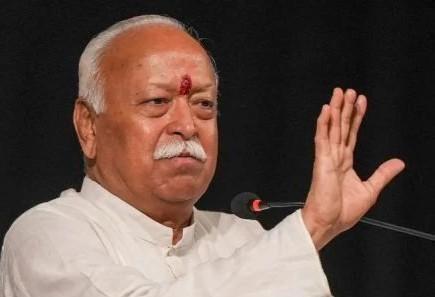
If someone turns to evil then we’ll teach lesson: Bhagwat on J&K attack
In the wake of the recent terror attack in Pahalgam, Jammu and Kashmir, Mohan Bhagwat, the Chief of the Rashtriya Swayamsevak Sangh (RSS), made some bold statements that have sent shockwaves across the nation. In a video conference, Bhagwat emphasized that non-violence is indeed India’s religion, but added that teaching a lesson to “oppressors and hooligans” is also essential. This statement has sparked a heated debate, with many questioning the nature of the RSS’s stance on violence and the role of the government in upholding law and order.
As the nation grapples with the aftermath of the Pahalgam attack, which left several people injured and one dead, Bhagwat’s remarks have brought the spotlight back on the RSS’s ideology and its relationship with the Indian government. While the RSS has traditionally been viewed as a Hindu nationalist organization, Bhagwat’s statement has raised questions about the organization’s stance on violence and its willingness to take a hardline approach to dealing with terrorism.
In the video conference, Bhagwat emphasized that the RSS’s primary goal is to protect the people of India and maintain law and order. He stated that the organization does not believe in harming or disrespecting its neighbors, but added that if someone is bent on being evil, then a lesson must be taught. “The king’s duty is to protect the people, and he will do his duty,” Bhagwat said, drawing a clear line between the role of the government and the RSS.
Bhagwat’s statement has been met with a mix of reactions, with some hailing it as a bold and necessary move to tackle terrorism, while others have criticized it as a call to violence and a departure from the organization’s traditional stance on non-violence. The RSS has long been associated with the ideology of Hindutva, which emphasizes the importance of Hindu values and the need to protect the Hindu community. However, Bhagwat’s statement has raised questions about the extent to which the organization is willing to go to achieve its goals.
The Pahalgam attack, which was carried out by unidentified terrorists, has sparked widespread outrage and condemnation. The attack has also led to calls for greater security measures and a tougher stance on terrorism. Bhagwat’s statement has been seen by many as a reflection of this sentiment, with the RSS chief emphasizing the need for the government to take a strong and decisive stance against terrorism.
However, others have criticized Bhagwat’s statement as a call to violence and a departure from the organization’s traditional stance on non-violence. The RSS has long been associated with the ideology of non-violence and Ahimsa, which emphasizes the importance of non-violent resistance. However, Bhagwat’s statement has raised questions about the extent to which the organization is willing to compromise on its principles in order to achieve its goals.
The RSS has a long history of involvement in Indian politics, dating back to the early 20th century. The organization was founded by K.B. Hedgewar in 1925 and has since become one of the most influential and controversial organizations in India. The RSS has been associated with numerous political parties and has played a key role in shaping Indian politics.
The RSS’s relationship with the Indian government has been complex and often contentious. The organization has been accused of promoting Hindu nationalism and has been involved in numerous controversies, including the 2002 Gujarat riots and the 2016 Dadri lynching. However, the RSS has also been praised for its role in promoting national integration and its contributions to Indian society.
In conclusion, Bhagwat’s statement has sparked a heated debate about the nature of the RSS’s ideology and its relationship with the Indian government. While the organization has traditionally been associated with the ideology of non-violence and Ahimsa, Bhagwat’s statement has raised questions about the extent to which the organization is willing to compromise on its principles in order to achieve its goals. As the nation grapples with the aftermath of the Pahalgam attack, it remains to be seen how the RSS will respond to the crisis and what lessons it will teach to those who seek to harm India.
Source: https://youtu.be/SpAKVWl5wII






